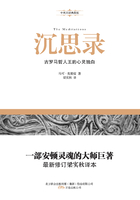In Part I. including the Prologue, no very great difficulties will appear.
Zarathustra's habit of designating a whole class of men or a whole school of thought by a single fitting nickname may perhaps lead to a little confusion at first; but, as a rule, when the general drift of his arguments is grasped, it requires but a slight effort of the imagination to discover whom he is referring to. In the ninth paragraph of the Prologue, for instance, it is quite obvious that "Herdsmen" in the verse "Herdsmen, Isay, etc., etc.," stands for all those to-day who are the advocates of gregariousness--of the ant-hill. And when our author says: "A robber shall Zarathustra be called by the herdsmen," it is clear that these words may be taken almost literally from one whose ideal was the rearing of a higher aristocracy. Again, "the good and just," throughout the book, is the expression used in referring to the self-righteous of modern times,--those who are quite sure that they know all that is to be known concerning good and evil, and are satisfied that the values their little world of tradition has handed down to them, are destined to rule mankind as long as it lasts.
In the last paragraph of the Prologue, verse 7, Zarathustra gives us a foretaste of his teaching concerning the big and the little sagacities, expounded subsequently. He says he would he were as wise as his serpent;this desire will be found explained in the discourse entitled "The Despisers of the Body", which I shall have occasion to refer to later.
...
THE DISCOURSES.
Chapter I. The Three Metamorphoses.
This opening discourse is a parable in which Zarathustra discloses the mental development of all creators of new values. It is the story of a life which reaches its consummation in attaining to a second ingenuousness or in returning to childhood. Nietzsche, the supposed anarchist, here plainly disclaims all relationship whatever to anarchy, for he shows us that only by bearing the burdens of the existing law and submitting to it patiently, as the camel submits to being laden, does the free spirit acquire that ascendancy over tradition which enables him to meet and master the dragon "Thou shalt,"--the dragon with the values of a thousand years glittering on its scales. There are two lessons in this discourse: first, that in order to create one must be as a little child; secondly, that it is only through existing law and order that one attains to that height from which new law and new order may be promulgated.
Chapter II. The Academic Chairs of Virtue.
Almost the whole of this is quite comprehensible. It is a discourse against all those who confound virtue with tameness and smug ease, and who regard as virtuous only that which promotes security and tends to deepen sleep.
Chapter IV. The Despisers of the Body.
Here Zarathustra gives names to the intellect and the instincts; he calls the one "the little sagacity" and the latter "the big sagacity."Schopenhauer's teaching concerning the intellect is fully endorsed here.
"An instrument of thy body is also thy little sagacity, my brother, which thou callest 'spirit,'" says Zarathustra. From beginning to end it is a warning to those who would think too lightly of the instincts and unduly exalt the intellect and its derivatives: Reason and Understanding.
Chapter IX. The Preachers of Death.
This is an analysis of the psychology of all those who have the "evil eye"and are pessimists by virtue of their constitutions.
Chapter XV. The Thousand and One Goals.
In this discourse Zarathustra opens his exposition of the doctrine of relativity in morality, and declares all morality to be a mere means to power. Needless to say that verses 9, 10, 11, and 12 refer to the Greeks, the Persians, the Jews, and the Germans respectively. In the penultimate verse he makes known his discovery concerning the root of modern Nihilism and indifference,--i.e., that modern man has no goal, no aim, no ideals (see Note A).
Chapter XVIII. Old and Young Women.
Nietzsche's views on women have either to be loved at first sight or they become perhaps the greatest obstacle in the way of those who otherwise would be inclined to accept his philosophy. Women especially, of course, have been taught to dislike them, because it has been rumoured that his views are unfriendly to themselves. Now, to my mind, all this is pure misunderstanding and error.
German philosophers, thanks to Schopenhauer, have earned rather a bad name for their views on women. It is almost impossible for one of them to write a line on the subject, however kindly he may do so, without being suspected of wishing to open a crusade against the fair ***. Despite the fact, therefore, that all Nietzsche's views in this respect were dictated to him by the profoundest love; despite Zarathustra's reservation in this discourse, that "with women nothing (that can be said) is impossible," and in the face of other overwhelming evidence to the contrary, Nietzsche is universally reported to have mis son pied dans le plat, where the female *** is concerned. And what is the fundamental doctrine which has given rise to so much bitterness and aversion?--Merely this: that the ***es are at bottom ANTAGONISTIC--that is to say, as different as blue is from yellow, and that the best possible means of rearing anything approaching a desirable race is to preserve and to foster this profound hostility. What Nietzsche strives to combat and to overthrow is the modern democratic tendency which is slowly labouring to level all things--even the ***es.















